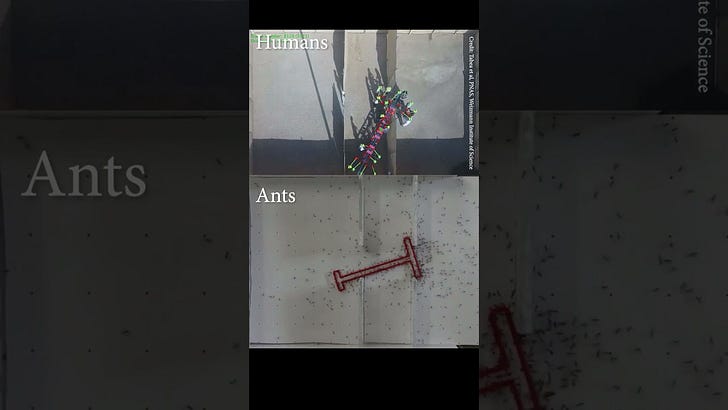You Guys Seen This Ant Thing?
A couple weeks back, I came across an “experiment:”
And I wanted to share this experiment with you because it’s a great example of how something can appear to be information, but because of really awful experimental design, is essentially useless.
The Setup:
What you’ll see in the video is an overhead shot two groups. One is a group of humans, the other a group of ants. Both groups are given the same task with approximately the same dimensions, just scaled up: to maneuver a “T-shaped” object through what I’d describe as two doorways.
The goal was to see whether humans or ants were better communicators, and the test was to see who could accomplish this task more efficiently.
Problem 1:
The humans were prevented from communicating with each other, which replicates the limited communication abilities of ants.
Uh, no.
It’s pretty well-established that ants communicate through pheromones and other means, and it’s more recently been theorized that ants are communicating acoustically. You know, like talking.
It’s entirely possible that ant signals are not as sophisticated as human speech, however, ants have survived and thrived for around 150 million years on Earth. Meaning that whatever they’re doing, it seems to work just fine for their needs.
I mean, overall, pretty stupid experimental design from the get-go. Humans lost their primary communication method while ants kept theirs. Perhaps the intent here was to put ants and people on the same level, but by removing the only communication options of one group while allowing the other to rely on its normal methods, we aren’t really getting the information we’re looking for.
Problem 2: Needs
A group of ants maneuvering a large object through a tricky space is something ants do quite often. A large group of humans maneuvering an object through a tight space is something you do about every 5 years or so when you’re an Elder Millennial like me and have no prayer of ever owning a home. Until you hit your mid 30s and it’s time to hire movers.
Guys, if you’re 34 or older, and you’re moving, hire movers. Just do it. Your friends are no longer young, they’ll be laid up for like 4 days if you make them try to shove a memory foam mattress up a staircase.
You can’t really give ants and humans the same task, thinking it’s equal, when it’s a task that one of the two groups does almost daily. It’s hard for me to think of something both ants and humans do regularly, but humans more often…have a human leave their dwelling and return without getting lost? See who can go further?
I did a bunch of math, guessing from some internetting that an ant can find its way home from 100 meters away, and making an ant’s size and ours closer to equivalent, I reckon this would put me about 5 miles away from home with the need to return. If I was dropped 5 miles from home in any direction, I could definitely find my way back with very little trouble. I would be comfortable doubling that, honestly, and I could go even further if we were talking about not the physical strain, but let’s say I could walk away from my house for 30-40 miles and then need to find my way back—having done it going one way, it’d be pretty easy for me to find my way back.
Problem 3: Interpretation
Humans were going after short-term solutions that seemed efficient, but were less effective overall.
I’m not really sure what this means, I reckon humans were trying to think it through rather than guess and check? Doesn’t matter, this is the important part:
This is likely because each human in the group wanted to move the object in their own way. Ants, on the other hand, acted as a single, unified entity with one shared goal.
And there’s the part where we slap a narrative on something that’s not a narrative, the place where a story stands in for what we see.
Which is not science.
Is this a reasonable conclusion based on this experiment? That humans, because we’re selfish or self-centered, do a worse job at performing group tasks?
Looking Outside the Experiment
I would argue a VERY different interpretation:
For starters, it turns out that humans are not great at doing ant tasks in the manner ants would do them. Which, duh.
More seriously: Humans are really good at performing group tasks that shape the world in ways that do not require us to make maneuvers like this.
Humans, as a collective, have invented, built, and can operate machines that would make this task quite a bit easier.
Humans, as a collective, agree upon building standards that rarely require this level of maneuvering.
Humans, when dealing with something like this object, may realize they’ll need to build the building around the object to an extent.
I mean, a big piece of furniture, like a bed frame, you might take it apart first, no?
I had a buddy when I was young, his parents bought a (at the time) GIANT TV, and it wouldn’t fit in through the door, so they took out a huge window near the back of the house and brought it in that way.
I posit that humans are just as good at a task like this, we just accomplish it using different tools and with the knowledge that we do have a lot more control over our environment than an ant.
One Thing To Always Watch
Does the experiment actually test what you think it’s testing?
Does setting humans and ants to a physical task frequently performed by ants, and removing the humans’ communication methods—does this prove that ants work better as a team?
Does reading fiction make one empathetic, or do the empathetic like reading fiction? Or neither? Or both?
The Rub
With all of this boiling my loins (is that a way of saying you’re angry? “Boiling my loins?” That can’t be right…), I looked up the original study, and what I found is that the original study and the way it’s being “reported” all over the internet are really, really different.
The study was, in fact, well-designed, interesting, and not really meant to figure out if ants are better team players than humans.
Here’s a bit:
…when debate is prohibited, people tend to reach a consensus quickly. In this case, in line with the notion of groupthink, people tend to forsake their personal opinion and promote a different one, not because they think it is the better option, but because it is the option they believe is most likely to be independently chosen by others.
and then later:
Communicating groups reach consensus in a very different manner: at the beginning of a solution attempt, and before any motion commences, they tend to spend tens of seconds conversing…The ability to discuss frees the group from the urge to make a single-shot decision and they can, instead, take their time to advocate for less obvious, but more accurate choices toward a joint decision. The fact that a joint decision to move to the indirect option takes significantly longer than a decision to move greedily strengthens the claim that communication is crucial for forming a consensus around a less obvious choice.
and finally:
Nevertheless, the communicating group does marginally outperform its average group member. We find that the primary factor for this improvement stems from the communicating groups’ ability to specifically escape the dead-end state b without exploring all its cul-de-sacs. Apparently, this is done as some group members use speech to demonstrate that this is a dead-end before further futile state transitions are attempted. This implies that a large enough minority of participants can use discussion to sway the group from the common knowledge opinion toward a nontrivial shortcut.
No, wait, really And Finally:
People are more flexible in selecting tools from their cognitive repertoire and can finely adjust their problem-solving tactics to suit the particular task at hand. While this flexibility can enhance individual performance, it inevitably results in interpersonal differences that may require more advanced communication to avoid worsening collective performances and allow for effective cooperation.
So, it seems to me that what we’ve really discovered here is a lot, but nothing like, “Ants are better at stuff than humans.”
What DO We Learn?
Well, probably some very interesting things about ants. But who gives a shit?
I would say the most interesting part of this is the part about how humans can use discussion to move the group away from common knowledge and get them to try a potentially good, unintuitive option.
And this is both a good thing and a bad thing.
This is a bad thing when someone is able to sway people away from thinking, say, that climate change is a problem.
This is probably a good thing, though, when we’re looking at exploring solutions to climate change.
In other words, the human capacity for thought and debate is probably best used when we can start out by agreeing about the problem we’re trying to solve, and then we can use our creativity and alternative thinking to suggest solutions to that problem that may not be immediately obvious.
How’s about instead of putting our energy into debating whether or not we got to The Moon, we agree that the problem of space exploration is getting to Mars?
Agreeing on the Problem
To bring this into the real world, the today world, let’s talk about school shootings. Happen all the time, right?
But, politically, we don’t approach the problem the same way. We don’t all look at it as being, “The problem is that kids are getting shot for no reason, and we need to prevent that from happening.”
Instead, we look at it like, “The problem is that kids are getting shot, but if I go after guns on any level, I won’t be able to retain my political power,” or, “The problem is that kids are getting shot, and I’m putting all my eggs in the gun control basket, even though that solution doesn’t seem like one we can force through the government.”
We aren’t all trying to solve the same problem, here. And perhaps this is why we don’t get anywhere. Instead of saying we have to stop this from happening, we stand around and debate the ramifications and outcomes of different, hypothetical, unrealistic solutions. Instead of picking up the T-shaped object and figuring it out, we stand around it, look at it, talk about it, but someone over on that end is really talking about how they can prove their the smartest in the group, someone over to your left is wondering if we’re getting lunch soon, and so on.
“That guy just wants you to stand on that end of the T-shaped object so you’ll move over this way, then he’ll walk through the door first with his end and everyone will clap for him and think he’s the best because he was first.”
“That guy’s solution is no good because he’s an asshole.”
The T-Shaped Object Must Pass Through The Hallway
While this flexibility can enhance individual performance, it inevitably results in interpersonal differences that may require more advanced communication to avoid worsening collective performances and allow for effective cooperation.
A benefit to the ants is that they don’t really have the capacity/ability to question whether the goal is worth it. They have an imperative: get the thing through the door. Whether or not Steve, the ant next to you, is cool or not is totally irrelevant.
I wonder if we might get a lot further if we started with an imperative:
School shootings must stop.
The spread of disease must be slowed.
The financial limitations of an individual who is working full-time and paying for health insurance should not be a factor in the medical care they receive (my personal beliefs go much further than this, I don’t feel anyone benefits by someone else receiving little or no care, but we can at least just start here, I think we can all agree on this one).
Kale should taste like french fries.
And then we can talk about solutions. AFTER we’ve agreed that the problem must be solved. AFTER we’ve agreed that we’re not going to accept things continuing as they have been.
My Sacrifice
Once we agree that a problem MUST be solved, we can start having the discussion about which sacrifices are worthwhile.
Because sacrifices WILL be required. If we want to reduce the amount of plastic destroying the environment, or destroying our bodies if you're a big microplastics person, there’s a good chance a Coke will cost you a little more. There’s a good chance we’ll need to be better about recycling those glass bottles in order to keep things sustainable, and that requires some small efforts on your part.
What’s Funny
Nothing. Well, okay, some things.
 Tiktok failed to load.
Tiktok failed to load.Enable 3rd party cookies or use another browser
But what’s funny about this study, and the reporting of it, is that the way people are talking about it seems, to me, specifically designed to foster disagreement, which is the Achilles’ Heel, the Pete’s Insatiable Hunger for Bugles of the whole human race.
When we can agree on some basic stuff, we can do great things.
When we spend our time distracted by argument presented as “information,” we spend our entire day looking at bullshit like this heavily-misunderstood version of the ant experiment when we could just be doing something useful, like laughing at an elderly woman who is probably long dead based on the screams in the above video.
My signoff on this one?
Basically, when someone presents a study, remember that the study contains information, and the presentation of it may not. Probably doesn’t. And, when you watch a presentation as opposed to seeing the original material, you’re relying on the presenter to both A) be competent enough to understand the study, and B) have no incentive to lie to you.
You might be thinking that in presenting you info, a fellow ant is helping you carry a T-shaped object through a corridor.
But in reality, that other ant just wants likes, votes, clicks, money, and follows, and they don’t give one ant-sized fuck whether that T-shaped object ever makes it one step closer to the doorway.




